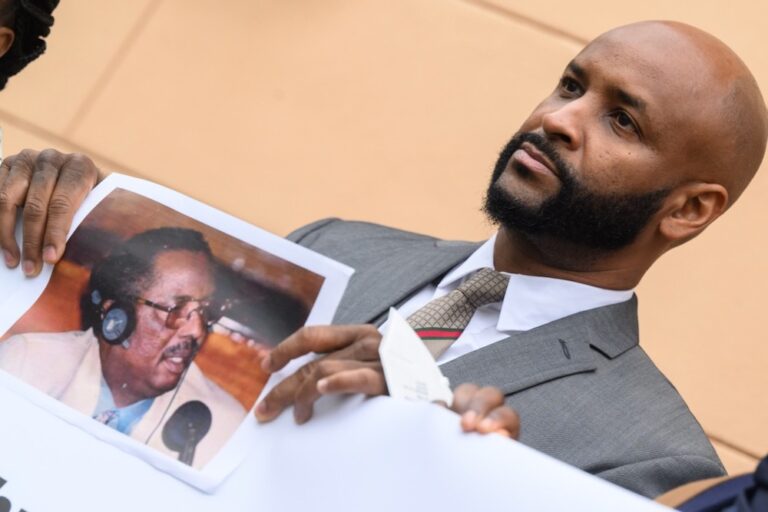Abdoulie John has been detained without charge since 7 January. Local journalists told CPJ that they believed security agents were focusing on John's reporting for Jollof News. The website, which is blocked in the country, has often reported critically about the government, the journalists said.
UPDATE: In The Gambia, President Jammeh’s hostility to the media continues After three days in detention, The Gambia’s National Intelligence Agency has freed journalist Abdoulie John. He was held while officers searched his laptop for evidence of wrongdoing, according to local sources, but was released just before a 72-hour deadline would have expired, after which authorities would have to charge or release him. However, the investigation against him continues. (IPI, 10 January 2013)
(CPJ/IFEX) – 9 January 2013 – Gambian authorities should immediately release Abdoulie John, a journalist who has been detained without charge in Banjul since Monday, the Committee to Protect Journalists said today. John has been harassed by the Gambian National Intelligence Agency (NIA) since early December, news reports said.
John, editor of the online news website Jollof News and a contributor to The Associated Press, was summoned for questioning at the headquarters of the NIA at around 2 p.m. on Monday, Lamin Jahateh, a representative of the Gambia Press Union, who was with John at the time, told CPJ. John was questioned for about three hours, he said. Emil Touray, president of the union, told CPJ that the agents took John to his home where they conducted a search, before returning him to custody.
The NIA agents first said that John would be released if he allowed them to screen his laptop and phones, according to Gibairu Janneh, the secretary-general of the union. Janneh and Touray, along with Lamin Camara, John’s lawyer, brought the laptop to the agency on Tuesday, they said. After the agents searched the laptop for several hours and found nothing incriminating, they told Janneh that John wouldn’t be released until he granted the officials access to his personal emails, Janneh told CPJ.
Local journalists told CPJ that they believed security agents were focusing on John’s reporting for Jollof News. The website, which is blocked in the country, has often reported critically about the government, the journalists said.
Camara was allowed to visit John, who said he had not been mistreated, the AP reported. Under Gambian law, police may detain individuals for 72 hours without charge. No warrant had been issued for John as of this afternoon, according to local journalists.
NIA agents had previously arrested John in connection with an alleged argument between him and Sulayman Gassama, the official photographer for President Yahya Jammeh, on December 9, the AP reported. John was reporting for the AP on eight Senegalese individuals who had been released to Gambian authorities by separatist rebels of the Casamance Movement of Democratic Forces (MDFC) in neighboring Senegal. Gassama had asked John why he was there to cover the hostage release, and an argument subsequently erupted, news reports said. NIA agents then detained John overnight at the NIA headquarters, confiscated his passport, and ordered him to pay US$1,500 on bail, news reports said. They also told him to report repeatedly to the agency to be questioned in connection with an investigation about which they did not offer details, the reports said.
Captain Lamin Saine, the NIA’s deputy director general, and Louis Gomez, the NIA’s director of operations, told CPJ they had “no idea” about John’s case. The NIA has a record of abuse in connection with journalist detentions. In 2008, the Nigeria-based Court of Justice of the Economic Community of West African States ruled that the agency should release Ebrima “Chief” Manneh, a Gambian reporter who disappeared after being arrested by NIA officers in 2006, according to news reports. The same court also concluded that the NIA carried out an illegal arrest and torture of exiled journalist Musa Saidykhan.
“We are deeply troubled by the arrest of Abdoulie John and are concerned about his well-being in the custody of Gambia’s National Intelligence Agency, which has a documented record of disappearing and torturing journalists,” said CPJ Africa Advocacy Coordinator Mohamed Keita from New York. “We hold the Gambia responsible for John’s well-being and call for his immediate release and the end of this pattern of harassment against this journalist.”
The AP released a statement Tuesday protesting John’s detention and said that John had been assigned to cover the release of the hostages. Local and international human rights and press freedom groups have condemned the harassment against John.


